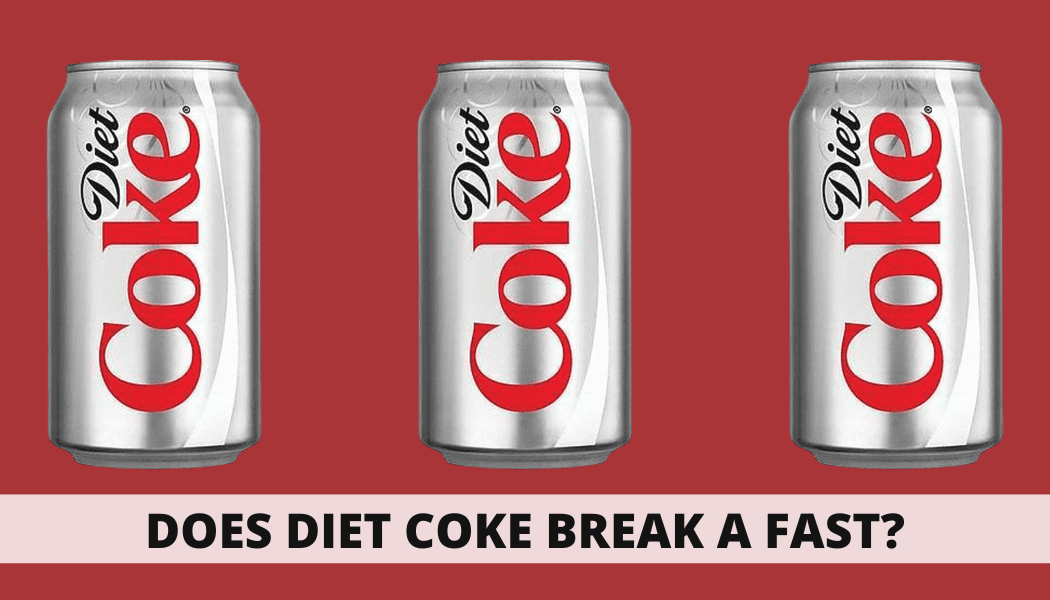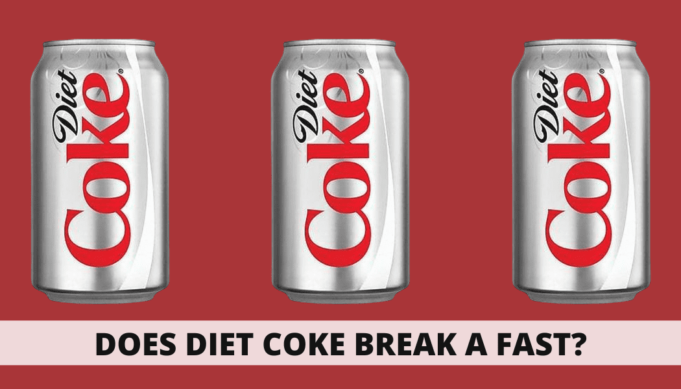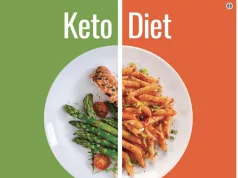Does Diet Coke break a fast? It’s a question that’s bubbled up in the minds of many intermittent fasting enthusiasts, especially those who crave a bit of fizz during their fasting window. After all, who can resist the allure of a sugar-free soda?
But does this seemingly innocuous beverage throw a wrench into your fasting plans? Let’s dive into the fizzy world of Diet Coke and fasting to uncover the truth!
Intermittent fasting, with its various methods like 16/8 or 5:2, has gained immense popularity as a way to manage weight, improve metabolic health, and even boost brain function. But while many of us happily swap our morning latte for a glass of water, the question of Diet Coke often lingers.
Does it trick our bodies into thinking we’re eating, or does it actually have minimal impact on our fasting state?
Understanding Intermittent Fasting
Intermittent fasting (IF) is an eating pattern that cycles between periods of eating and voluntary fasting. It’s not a diet in the traditional sense, as it doesn’t restrict what you eat but rather when you eat. There are various methods of IF, each with its own schedule and rules.
Methods of Intermittent Fasting
Intermittent fasting methods involve alternating between periods of eating and fasting, each with its own set of rules.
- Time-Restricted Feeding:This involves limiting your eating window to a specific timeframe each day. Popular examples include the 16/8 method (fasting for 16 hours and eating within an 8-hour window) and the 12/12 method (fasting for 12 hours and eating within a 12-hour window).
- Alternate-Day Fasting:This method involves alternating between days of eating normally and days of fasting. It’s a more extreme form of IF, and it’s not suitable for everyone.
- Eat-Stop-Eat:This method involves fasting for 24 hours once or twice a week. It’s another more extreme form of IF that can be challenging to maintain.
- 5:2 Diet:This method involves eating normally for five days a week and restricting calories to 500-600 for two non-consecutive days. It’s a less extreme form of IF that can be easier to maintain.
Principles of Intermittent Fasting
Intermittent fasting is not about cutting calories but rather about altering your eating patterns. The principles behind IF revolve around the body’s natural metabolic processes and the potential benefits of allowing your body to enter a fasted state.
Intermittent fasting is not about starving yourself, but rather about giving your body a break from constantly digesting food.
Importance of Calorie Intake
While intermittent fasting doesn’t restrict what you eat, it’s crucial to be mindful of your overall calorie intake. If you consume excessive calories during your eating window, you may not experience the full benefits of IF.
The goal of intermittent fasting is to create a calorie deficit, which can lead to weight loss and other health benefits.
Diet Coke and its Composition: Does Diet Coke Break A Fast
Diet Coke, a popular carbonated beverage, is often consumed by those looking to reduce their sugar intake. However, its composition raises questions about its potential impact on the body, particularly during a fast.
Artificial Sweeteners and Their Effects on Metabolism
Artificial sweeteners, such as aspartame, are the primary contributors to Diet Coke’s zero-calorie status. These sweeteners are designed to mimic the sweetness of sugar without providing the same caloric load. However, their effects on metabolism are a subject of ongoing research and debate.
So, you’re wondering if that Diet Coke you’re craving will ruin your fast? Well, it’s a bit of a gray area. But honestly, if you’re really concerned about breaking a fast, maybe you should just ditch the whole diet thing altogether and embrace the joys of eating without restrictions.
Check out this article on how not to diet for some seriously liberating ideas. Then, you can have your Diet Coke, and your guilt-free, delicious meal, too! Because at the end of the day, isn’t a little happiness worth more than a few extra calories?
- Potential Impact on Gut Microbiota:Some studies suggest that artificial sweeteners may alter the composition and function of the gut microbiota, which plays a crucial role in digestion, immunity, and overall health. Changes in gut bacteria could potentially influence metabolism and contribute to weight gain or other health issues.
- Insulin Response:While artificial sweeteners do not directly raise blood sugar levels, they can trigger an insulin response in some individuals. This response may be weaker than that caused by sugar, but it could still disrupt the normal hormonal balance associated with fasting.
- Cravings and Sugar Intake:The sweet taste of artificial sweeteners may actually increase cravings for sugary foods, leading to increased overall sugar consumption and potentially negating the benefits of choosing a diet beverage.
Impact on Insulin Levels and Blood Sugar
Diet Coke’s lack of sugar means it does not directly contribute to blood sugar spikes. However, its artificial sweeteners can trigger a small insulin response in some individuals.
- Insulin Response and Fasting:Insulin is a hormone that helps regulate blood sugar levels. During fasting, insulin levels typically decrease to allow the body to access stored energy. While the insulin response to artificial sweeteners is generally weaker than that to sugar, it could potentially disrupt the natural decline in insulin levels during a fast, potentially interfering with the body’s metabolic processes.
- Individual Variability:The impact of artificial sweeteners on insulin levels can vary significantly from person to person. Factors like genetics, gut health, and overall diet can influence the response to these sweeteners.
Diet Coke’s Impact on Fasting
The question of whether Diet Coke breaks a fast is a common one among those practicing intermittent fasting. It’s a tempting drink for those seeking a sugar-free, calorie-free option, but its impact on the body’s fasting state is a topic of debate.
Let’s delve into the science behind Diet Coke’s effect on fasting.
Diet Coke’s Potential Impact on Fasting
While Diet Coke is calorie-free, it contains artificial sweeteners that can trigger insulin release, albeit to a lesser extent than sugar. Insulin is a key hormone that helps regulate blood sugar levels and promotes fat storage. During fasting, insulin levels typically decrease, leading to the breakdown of stored fat for energy.
However, the presence of artificial sweeteners in Diet Coke can potentially disrupt this process.
Comparing Diet Coke to Water
Water is the gold standard for hydration during fasting. It doesn’t contain any calories or artificial sweeteners, and it doesn’t stimulate insulin release. Therefore, water is the ideal choice for maintaining a true fasting state. While Diet Coke might not completely break a fast, it could potentially hinder the body’s natural hormonal response to fasting, potentially affecting its effectiveness.
Diet Coke’s Influence on Hormonal Response
Several studies have investigated the effects of artificial sweeteners on insulin secretion and glucose metabolism. While the results are not entirely conclusive, some studies suggest that artificial sweeteners can trigger a mild insulin response.For example, a study published in the journal “Diabetes Care” found that consuming aspartame, a common artificial sweetener, led to a slight increase in insulin levels in healthy individuals.
While this increase was smaller than that observed with sugar, it could still potentially impact the body’s fasting response.Furthermore, some researchers believe that artificial sweeteners may disrupt the gut microbiome, which plays a role in regulating insulin sensitivity. This disruption could potentially influence the body’s hormonal response to fasting.It’s important to note that the research on this topic is still ongoing, and more studies are needed to fully understand the long-term effects of artificial sweeteners on fasting.
Factors Affecting Fasting Outcomes
Intermittent fasting, like any other lifestyle change, is not a one-size-fits-all approach. Numerous factors can influence its effectiveness, making it crucial to understand these variables to maximize your fasting experience.
Individual Factors
Individual factors play a significant role in how your body responds to intermittent fasting. These factors can include:
- Age:Younger individuals may find it easier to adapt to fasting due to a faster metabolism and greater insulin sensitivity. As we age, our metabolic rate slows down, and insulin sensitivity decreases, which can impact fasting outcomes.
- Genetics:Our genetic makeup influences our metabolic rate, hormone levels, and overall body composition. Some individuals may be predisposed to losing weight more easily with fasting, while others may find it more challenging.
- Health Conditions:Certain health conditions, such as diabetes, thyroid disorders, or autoimmune diseases, can affect how your body responds to fasting. Consulting with a healthcare professional is essential before starting any new diet, especially if you have pre-existing health concerns.
- Medications:Some medications can interact with fasting, potentially leading to side effects or altering fasting outcomes. It’s crucial to discuss your medications with your doctor before embarking on intermittent fasting.
Lifestyle Choices, Does diet coke break a fast
Lifestyle choices can significantly impact the effectiveness of intermittent fasting.
Exercise
Exercise is a powerful tool that can enhance the benefits of intermittent fasting. Regular physical activity helps boost metabolism, improve insulin sensitivity, and increase calorie expenditure.
Moderate-intensity exercise during fasting periods can further enhance fat burning and improve overall health outcomes.
So, you’re wondering if that Diet Coke will sabotage your fast? It’s a common question, but the real kicker is, if you’re thinking about a keto diet, you might want to check out is keto diet safe before you start.
Keto might be a whole different ballgame when it comes to those bubbly beverages. But hey, if you’re fasting, maybe just stick to water for a while – your taste buds will thank you later.
Sleep
Sleep deprivation can disrupt hormone balance, increase hunger, and hinder weight loss. Adequate sleep is crucial for optimal fasting results.
Aim for 7-8 hours of quality sleep per night to support your body’s natural rhythms and maximize fasting benefits.
External Factors
External factors can also influence fasting outcomes.
So, you’re wondering if Diet Coke breaks a fast? The short answer is, it probably depends on your definition of “fast.” But if you’re looking to lower your cholesterol, how to low the cholesterol with diet might be a better place to start.
After all, you don’t want to break your fast with a fizzy drink, only to break your heart with high cholesterol later! Just saying.
Stress
Chronic stress can trigger the release of cortisol, a hormone that promotes fat storage and hinders weight loss.
Managing stress through techniques like meditation, yoga, or spending time in nature can positively impact fasting outcomes.
Environmental Factors
Factors like temperature, humidity, and exposure to pollutants can influence metabolism and energy expenditure.
Staying hydrated and maintaining a comfortable environment can optimize fasting results.
Alternative Considerations

So, you’re all set to embark on your intermittent fasting journey, but the thought of giving up Diet Coke is making you sweat more than a marathon runner in a sauna. Don’t worry, you’re not alone! There are plenty of delicious and refreshing alternatives that won’t derail your fasting goals.
Let’s explore some options and see how they stack up.
Beverage Alternatives During Intermittent Fasting
The key to choosing the right beverage during fasting is to keep your blood sugar stable and avoid triggering insulin spikes. Here are some top contenders that fit the bill:
- Water:The undisputed champion! It’s calorie-free, hydrating, and doesn’t interfere with your fast. Think of it as the Beyoncé of beverages – always on point.
- Unsweetened Tea:Green tea, black tea, and herbal teas are all great choices. They’re low in calories and can even provide some health benefits. Just be sure to skip the sugar and artificial sweeteners.
- Black Coffee:Coffee lovers, rejoice! Black coffee is a fasting-friendly beverage that can boost your metabolism and help you feel more alert. Just steer clear of those sugary lattes and caramel macchiatos.
- Sparkling Water:If you’re missing the fizz of soda, sparkling water is a great alternative. It’s refreshing, calorie-free, and comes in a variety of flavors.
Comparing Beverage Effects on Fasting
Let’s take a closer look at how different beverages affect your fast and see how they compare:
| Beverage | Calorie Content | Effect on Fasting | Notes |
|---|---|---|---|
| Water | 0 calories | No effect | The ideal fasting beverage. |
| Unsweetened Tea | 0-5 calories (depending on type) | Minimal effect | Choose herbal, green, or black tea without added sugar or sweeteners. |
| Black Coffee | 0-5 calories (depending on brewing method) | Minimal effect | Avoid adding sugar, cream, or artificial sweeteners. |
| Diet Coke | 0 calories | Potentially disruptive | May trigger insulin spikes and disrupt the fasting state. |
| Fruit Juice | Variable | Disruptive | High in sugar and can cause significant insulin spikes. |
Foods and Drinks to Avoid During Fasting
While we’re on the topic of fasting, let’s talk about the foods and drinks that you should avoid during your fasting window. Think of it as a “no-fly zone” for your body’s fasting state. Here’s a list of culprits to steer clear of:
- Sugary Drinks:Soda, juice, energy drinks, and sweetened teas can all spike your blood sugar and disrupt your fast.
- Alcohol:Alcohol can interfere with your body’s ability to burn fat and can also lead to dehydration.
- High-Calorie Foods:Anything that’s high in calories, like fast food, processed snacks, and desserts, should be avoided during your fasting window.
- Artificial Sweeteners:While they may be calorie-free, artificial sweeteners can still stimulate your insulin response and may disrupt your fast.
Individualized Approach
Intermittent fasting, like any dietary change, is not a one-size-fits-all approach. It’s crucial to understand that your body and its response to fasting are unique. Factors like your age, health status, activity level, and individual goals all play a significant role in determining the effectiveness and safety of fasting.
Consult a Healthcare Professional
Before embarking on any fasting regimen, it’s essential to consult with a healthcare professional, such as a doctor, registered dietitian, or certified nutritionist. They can assess your overall health, identify any potential risks or contraindications, and provide personalized guidance tailored to your specific needs.
Personalized Advice
Your healthcare provider will consider your medical history, current medications, and any underlying health conditions. They will help you determine a fasting protocol that aligns with your individual goals, whether it’s weight loss, improved insulin sensitivity, or enhanced cognitive function.
Thorough Research and Informed Decisions
In addition to professional advice, it’s crucial to conduct thorough research and gather information from reputable sources. Understanding the science behind intermittent fasting, the potential benefits and risks, and the different types of fasting protocols available will empower you to make informed decisions about your health.
Closing Notes
So, can you enjoy a Diet Coke during your fast? The answer, like most things in the world of health and wellness, is a bit nuanced. While Diet Coke doesn’t contain calories, its artificial sweeteners might trigger insulin spikes and disrupt your body’s natural fasting response.
Ultimately, the best approach is to listen to your body and experiment to see what works best for you. If you’re unsure, always consult with a healthcare professional for personalized advice. And remember, whether you choose to indulge in a Diet Coke during your fast or stick to plain water, the key is to enjoy the journey and make informed decisions about your health!
General Inquiries
Does Diet Coke affect my ketone levels?
While Diet Coke doesn’t contain calories, some studies suggest that artificial sweeteners might slightly interfere with ketone production. However, this effect is generally considered minimal.
Can I have Diet Coke during a keto diet?
The keto diet emphasizes high fat and low carbs. Diet Coke, being low in carbs, can fit into a keto diet. However, it’s best to limit your intake and prioritize water and other keto-friendly beverages.
Are there any other drinks I can have during a fast?
Absolutely! Plain water is always the best choice, but you can also enjoy unsweetened tea, black coffee, and even sparkling water. Just avoid anything with added sugar or artificial sweeteners.
























